The NVIDIA GeForce GTX 1660 Ti Review, Feat. EVGA XC GAMING: Turing Sheds RTX for the Mainstream Market
by Ryan Smith & Nate Oh on February 22, 2019 9:00 AM ESTBattlefield 1 (DX11)
Battlefield 1 returns from the 2017 benchmark suite, the 2017 benchmark suite with a bang as DICE brought gamers the long-awaited AAA World War 1 shooter a little over a year ago. With detailed maps, environmental effects, and pacy combat, Battlefield 1 provides a generally well-optimized yet demanding graphics workload. The next Battlefield game from DICE, Battlefield V, completes the nostalgia circuit with a return to World War 2, but more importantly for us, is one of the flagship titles for GeForce RTX real time ray tracing.
We use the Ultra preset is used with no alterations. As these benchmarks are from single player mode, our rule of thumb with multiplayer performance still applies: multiplayer framerates generally dip to half our single player framerates. Battlefield 1 also supports HDR (HDR10, Dolby Vision).
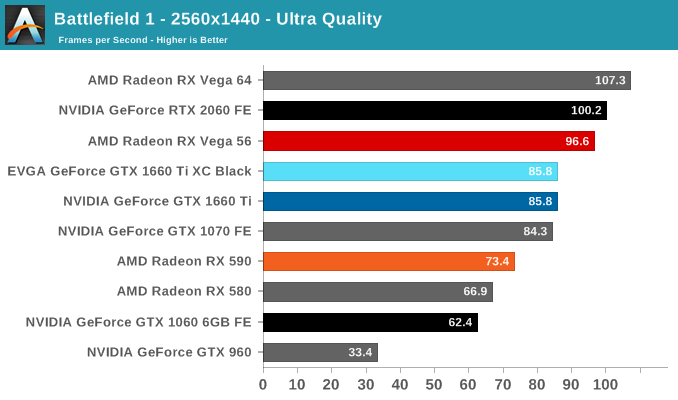
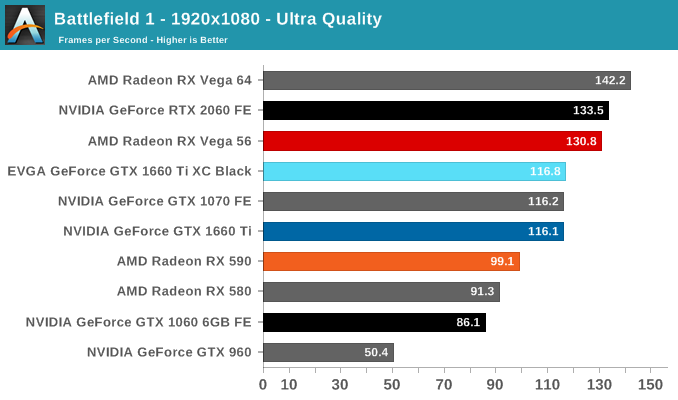
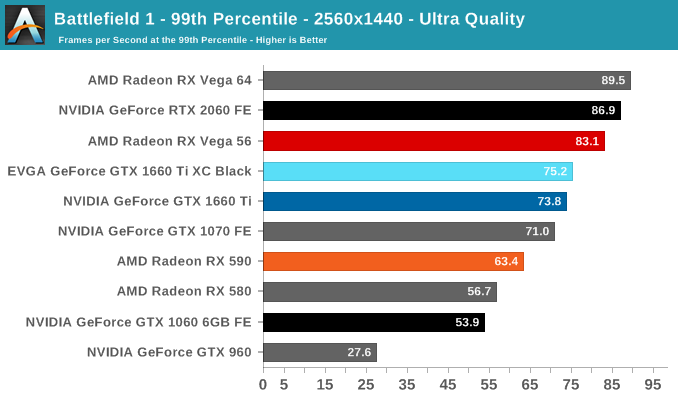
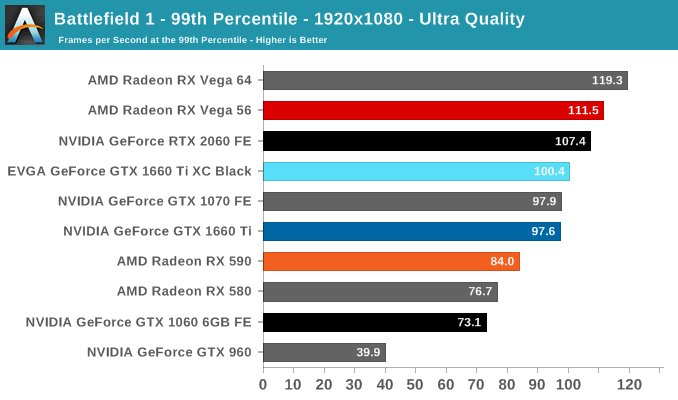
Right from the get-go, the GTX 1660 Ti stakes out its territory in between the RTX 2060 FE and RX 590, leaving the latter by the wayside. And as a result, it technically edges out the GTX 1070 FE, though for all intents and purposes it is a dead heat. The RX Vega 56, however, keeps ahead by decent amount; Battlefield 1 runs well on many GPUs, but Vega cards have always had a strong showing in this title.
The mild +10W TDP of the EVGA XC Black makes an equally mild difference, more so with the 99th percentiles.


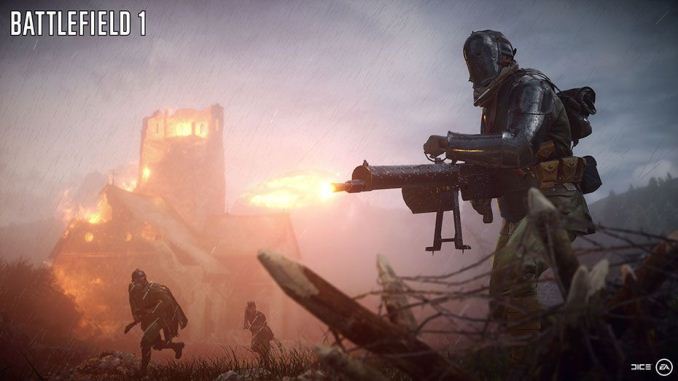








157 Comments
View All Comments
Oxford Guy - Saturday, February 23, 2019 - link
"The NVIDIA GeForce GTX 1660 Ti Review, Feat. EVGA XC GAMING: Turing Sheds RTX for the Mainstream Market"The same idea, restated:
"NVIDIA Admits, With Its GeForce GTX 1660 Ti Turing, That RTX Isn't Ready For The Mainstream"
just6979 - Saturday, February 23, 2019 - link
Why disable all AMD or NVidia specific settings? Any using those cards would have those settings on... shouldn't the number reflect exactly what the cards are capable of when utilizing all the settings available. You wouldn't do a Turing Major review without giving some numbers for RTX ON in any benchmarks that supported it...CiccioB - Monday, February 25, 2019 - link
Yes, the test could be done with specific GPU features turned on, but you have to clearly say what are the advantage of each particular addition on the final image quality.Because you can have (optional) effects that cuts frame rate but increase the quality a lot. So looking only at the mere final number you may conclude that a GPU is better than another because it is faster (or just costs less), but in reality you are comparing two different kind of quality results.
It's not different than testing two cards with different detail settings (without stating which they are) and then trying to understand which is the better one only based on the frame rate results (which is the kind of results that everyone looks at).
jarf1n - Sunday, February 24, 2019 - link
load power consuption is wrong,if you want see only gpu measured,measured only gpu like techpowerup doing.its clear if you measure total load,its not show it right.
134W 1660ti
292W vega 56
source:techpowerup
its clear that gtx 1660 ti is much much better gpu for at least FHD and QHD also.
huge different.
CiccioB - Monday, February 25, 2019 - link
Well, that however does not tell the entire story.The ratios versus the total consumption of the system is also important.
Let's say that for a gaming PC you already have to use 1000W. A card that suck 100W more just wastes 10% more of your power. Meanwhile if your PC is using 100W, such a card will be doubling the consumption. As you see the card is always using 100W more, but the impact is different.
Let's make a different example: your PC uses about 150W in everyday use. You have to buy an SSD. There are some SSD that consumes twice the power of others for the same performances.
You may say that the difference is huge.
Well, an SSD consumes between 2 and 5W. Buying the less efficient (5W) is not really going to have an impact on the total consumption of your PC.
ilkhan - Sunday, February 24, 2019 - link
Coming from a GTX970 and playing on a 2560x1600 monitor, which card should I be looking at?Ryan Smith - Monday, February 25, 2019 - link
You'd likely want an RTX 2060, if not a bit higher with the RTX 2070.https://www.anandtech.com/bench/product/2148?vs=23...
Mad Maxine - Monday, February 25, 2019 - link
Price is still crap for the performance. We live in a age now that sees Hardware and software no longer growing. And a GPU from 2012 Can still run all modern games today. Market is not going to be huge for Overpriced GPUs that are really not that much of a improvement from 2012.Oxford Guy - Monday, February 25, 2019 - link
Telemetry is growing. You are "your" data.bhanavi - Tuesday, February 26, 2019 - link
Thanks you so much for the informationhttps://apkmabbu.com
https://apkmabbu.com/gbwhatsapp-apk/
https://apkmabbu.com/ac-market-apk/
https://apkmabbu.com/lucky-patcher-apk/